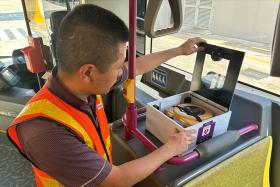More technology, beter jobs in the pipeline for PMETs
As a child, her father occasionally brought her on board and she got to see him at work as he drove his double-decker bus.
Today, Ms Kang Yen Yen, 41, is a bus captain for SBS.
Unlike the days when she was a child, captains now make use of new technology that make their jobs easier.
The bus that Ms Kang drives is equipped with Mobileye's Advanced Driver Awareness System, which helps her with blind spots.
"The system emits an audio and visual alert when there is a pedestrian, cyclist or motorist in my blind spot. It is especially important when I am turning the bus," Ms Kang told The New Paper.
This is the kind of technology that boost the Land Transport Industry Transformation Map (ITM), which was launched yesterday.
The map outlines initiatives which "leverage emerging technologies to make the land transport system smarter, drive productivity growth and deliver better service to commuters", the Land Transport Authority (LTA) said in a statement.
It will set aside $25 million over five years to fund mobility-related innovation and technology adoption.
Autonomous vehicles (AV), for which trials were first run in 2015, is one such technology that will be expanded, said Transport Minister Khaw Boon Wan.
"We are preparing for a pilot deployment of on- demand AV buses from 2022 for commuters in Punggol, Tengah and the Jurong Innovation District," Mr Khaw said.
Other tools such as smart sensors and robotic drones can also be used in areas like railway maintenance, he added.
With these new technologies and the expansion of the bus and rail systems, there should be 8,000 new jobs by 2030, adding to the current workforce of 21,000.
There will also be higher value-added transport jobs for more professionals, managers, executives and technicians because of the adoption of technology.
National Transport Workers' Union executive secretary Melvin Yong said in a blog post that he has been "losing sleep" over how technology could affect workers in the industry.
However, he added: "As the industry evolves rapidly with technological developments, a key objective of the ITM is to prepare and transition the workers through these changes with ease, and at the same time, develop and build a workforce that is well-equipped to take on future higher-value jobs."
Mr Khaw also said that public transport workers will be up-skilled and re-skilled to keep up with industry developments.
A Public Transport Skills Framework, which will provide a pathway for skills upgrading, will be launched in May.
Bus captain Ms Kang is enthusiastic about the latest developments.
"The new technologies have really helped me and given me more confidence in my driving. Although at first it can be a little confusing, a bit of practice makes it better."
Get The New Paper on your phone with the free TNP app. Download from the Apple App Store or Google Play Store now


